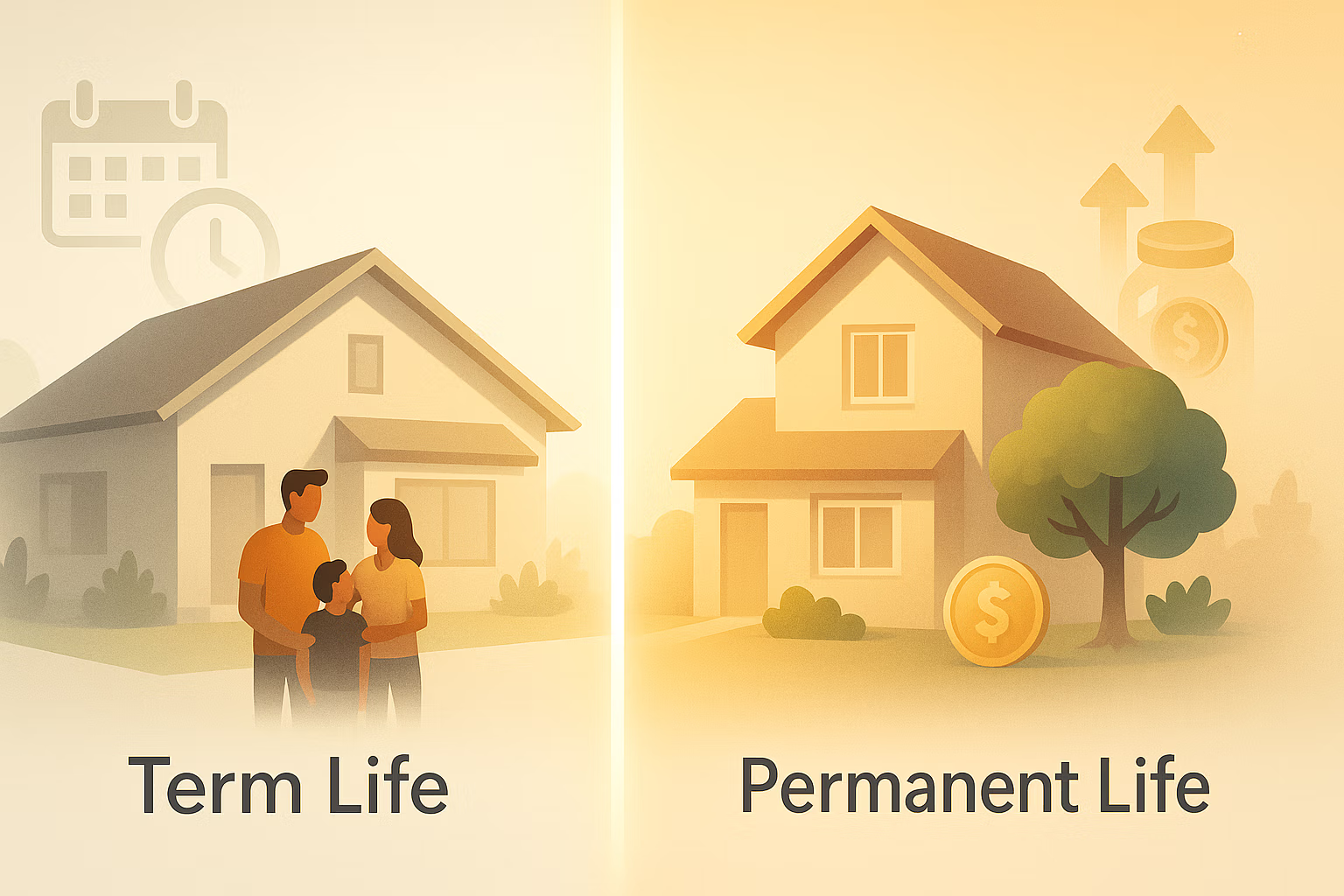
Life insurance is a financial protection plan. When you buy a policy, you’re creating an agreement with an insurance company:
You pay regular premiums.
In return, the insurer provides a tax-free death benefit to your loved ones when you pass away.
That benefit can help your family pay the mortgage, cover everyday expenses, handle final costs, or even continue long-term financial goals.
But modern life insurance goes further. Many policies today include living benefits, which can help you directly in the event of a serious illness or injury — offering flexibility and support while you’re still alive.
In other words, life insurance has evolved. It’s no longer just about protecting your family after you’re gone — it’s about protecting their stability while you’re here.
The main purpose of life insurance is simple: to make sure your loved ones are taken care of financially if something happens to you.
But when you think about what that really means — the mortgage payment, the bills, the education goals, the peace of mind — you start to see how big of a difference it can make.
Here’s what the right life insurance policy can do for you:
Protect your income: Replace lost earnings if you’re not there to provide.
Cover major financial obligations: Pay off debts, mortgage balances, or medical expenses.
Give your family breathing room: Allow time to grieve without financial stress.
Provide future security: Fund a child’s education, care for aging parents, or create an inheritance.
Offer living benefits: Access funds early if you’re diagnosed with a critical, chronic, or terminal illness.
Final Expense: Pay for burial costs so that your family doesn't have to deal with that burden with an already difficult time. According to GoFundMe, average funeral costs an average of $7,848
The truth is, life insurance isn’t about fear — it’s about freedom. Freedom to live fully, knowing your family is protected no matter what tomorrow looks like.
Life insurance falls into two broad categories: Term Life and Permanent Life (which includes Whole Life and Indexed Universal Life). Each serves a different purpose, depending on your goals and stage of life.
Term life is the most straightforward type of coverage. It lasts for a specific period — usually 10, 20, or 30 years — and provides a set amount of protection for that term.
It’s often chosen by families who want coverage during key financial years, such as paying off a mortgage or raising kids.
Key Benefits:
Simple and affordable.
Excellent short-to-medium-term protection.
Fixed premiums for the entire term.
Things to Consider:
Coverage ends when the term expires.
No cash value growth (pure protection only).
Term life is great for those who want peace of mind without committing to a lifelong policy.
Permanent life insurance lasts for your entire lifetime — as long as premiums are paid — and includes a savings component known as cash value.
There are a few main types, but the two most common are:
Whole Life Insurance – Offers guaranteed coverage, fixed premiums, and steady cash value growth. Easy to get a cheap child plan too.
Indexed Universal Life (IUL) – Offers lifetime protection with cash value growth linked to market performance (but protected from losses).
Key Benefits:
Lifetime coverage.
Cash value that grows tax-deferred.
Access to funds while alive through loans or withdrawals.
Things to Consider:
Premiums are higher than term life.
Works best as a long-term financial tool.
Permanent life is often chosen by people who want to build wealth safely, leave a legacy, or have protection that doesn’t expire.
One of the biggest changes in modern life insurance is the addition of living benefits — features that allow you to access part of your coverage while you’re still alive if you experience a major health event.
This includes:
Critical illness: heart attack, stroke, or cancer.
Chronic illness: when daily living activities become difficult.
Terminal illness: when diagnosed with a shortened life expectancy.
Living benefits can help pay for treatment, time off work, or simply allow you to maintain your lifestyle without draining savings.
It’s not just a payout — it’s practical protection that gives you flexibility when life takes an unexpected turn.
The cost of life insurance depends on a few things — age, health, lifestyle, and the type of policy you choose. But it’s often more affordable than people think.
Many plans start around $50 a month for healthy adults, offering a balance between affordability and meaningful coverage.
To get the best value, it’s worth comparing several carriers through an independent broker. They can help find the right fit without pushing one company’s product over another.
This depends entirely on your personal situation, but here are a few guidelines to start with:
Income replacement: Think about how many years of income your family might need. (Real median household income was $80,610 in 2023, according to U.S. Census Bureau, and I'm sure it has only gone up with inflation).
Debt coverage: Include your mortgage, car loans, and other obligations.
Family goals: Consider education costs, childcare, or elder care.
Final expenses: Factor in funeral and medical costs.
For some, the right policy is one that simply replaces income. For others, it’s a longer-term plan that builds cash value and can later supplement retirement or fund major milestones.
Life insurance isn’t just for parents or homeowners — it’s for anyone who wants to make sure their loved ones or dependents aren’t left struggling financially.
You might need it if you:
Have family or dependents relying on your income.
Own a home or business.
Carry debt that would transfer to others.
Want to lock in affordable coverage while you’re healthy.
Want lifetime protection that grows in value over time.
Even younger adults benefit from getting coverage early — it locks in low rates and provides future flexibility if health changes.
“It’s too expensive.”
Most people overestimate the cost by 2–3 times. Many plans start at around $50 per month.
“I don’t need it because I have work coverage.”
Employer plans typically end when you leave your job and rarely provide enough coverage to replace income. Plus, you can get locked in at good price early on and if your plan gets interest, you get to take advantage of the compounding over more years if you start earlier.
“I’m young and healthy — I can wait.”
Life insurance costs rise with age and health changes. The best time to buy it is when you don’t need it yet and can lock in a better price and take advantage of interest compounding over more years to get more benefit.
“It’s only useful after death.”
Modern policies offer living benefits and cash value — meaning your policy can serve you during your lifetime.
I’ll be honest — I didn’t always think much about life insurance. I understood what it was, but like most people, I figured I’d get to it eventually.
Then I had a recent health event that changed everything. It wasn’t something I could have predicted, and it made me realize just how quickly things can shift. Overnight, the “someday” decisions suddenly felt urgent.
That experience reshaped how I view protection. Life insurance isn’t just about covering a what-if — it’s about keeping control when life surprises you. It’s the ability to say, “No matter what happens, my family will be okay.”
And that feeling — that sense of security — is worth far more than the premium.
Life insurance doesn’t have to be confusing or expensive. It’s simply about protecting your family and creating peace of mind for the people you love most.
Whether you’re looking for short-term coverage or a lifelong plan that builds value, there’s an option to fit your needs and budget. The key is to start while you can — while health, time, and affordability are on your side and always use a broker with multiple carriers that can compare for you whether it's us (Click here) or someone else you trust, make sure to compare.
Because at the end of the day, life insurance isn’t about death — it’s about protecting life, stability, and everything that makes it worth living.
Can a life insurance beneficiary be a minor? Yes — but children can’t legally receive the payout directly. This guide explains what really happens, how to avoid court delays, and the safest ways to leave life insurance to a child using a custodian, trust, or designated adult. Perfect for parents, guardians, and godparents planning ahead.
Permanent Life Insurance offers more than coverage — it’s a lifelong plan for stability and peace of mind. With guaranteed protection, level premiums, and tax-deferred cash value, it helps you safeguard your family and build financial strength that lasts a lifetime.
Difference between term and whole life insurance. Choosing between term and whole life insurance can shape your family’s financial future. This guide breaks down the differences, pros and cons, and proven strategies for both.
What is whole life insurance? Whole life insurance offers more than just lifelong coverage—it builds cash value, creates wealth opportunities, and provides lasting protection. This guide explains what a whole life policy is, how it works, and strategies for making the most of it.
Final expense insurance—also called burial or funeral insurance—provides affordable, permanent coverage for end-of-life costs. This guide explains how it works, what it covers, and why it can ease the financial burden on your loved ones.
What is an IUL? Indexed Universal Life (IUL) insurance combines lifelong protection with market-linked cash value growth. This guide explains how an IUL works, its pros and cons, and strategies for using it as part of a financial plan.
What is term life insurance? Term life insurance is simple, affordable coverage that protects your family for 10–30 years. This guide explains how it works, its pros and cons, and strategies for using it.
What are living benefits? Living benefits turn life insurance into more than just a death benefit. They let you access funds while alive if you face illness or long-term care needs. This guide explains what living benefits are, how they work, and secrets on how to make them work for you.
Life Insurance 101 covers everything you need to know about protecting your family. Learn the basics of term, whole, IUL, final expense, mortgage protection, and living benefits—all explained simply with strategies for choosing the right policy.
Is Life Insurance Taxable? Most life insurance payouts are tax-free, but there are exceptions. This guide explains when life insurance is taxable, when it isn’t, and strategies to protect your family from unnecessary taxes.
Can a life insurance beneficiary be a minor? Yes — but children can’t legally receive the payout directly. This guide explains what really happens, how to avoid court delays, and the safest ways to leave life insurance to a child using a custodian, trust, or designated adult. Perfect for parents, guardians, and godparents planning ahead.
Permanent Life Insurance offers more than coverage — it’s a lifelong plan for stability and peace of mind. With guaranteed protection, level premiums, and tax-deferred cash value, it helps you safeguard your family and build financial strength that lasts a lifetime.
Difference between term and whole life insurance. Choosing between term and whole life insurance can shape your family’s financial future. This guide breaks down the differences, pros and cons, and proven strategies for both.